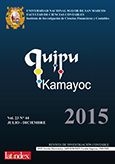THE EXPERT ACTIVITY AND NEW STANDARDS OF PROFESSIONAL GLOBALIZATION
DOI:
https://doi.org/10.15381/quipu.v23i44.11626Keywords:
Expert standards, higher education, social responsibility expertAbstract
In Ecuador, as in many other countries, the application of International Financial Reporting Standards (IFRS) caused controversy not only for accountants, but also for all professionals engaged in the activity as expert advisors of justice. In view of the exposed, it was considered necessary to study the implications of the application of regulations and observe if they generate incidents related to forensic accounting processes. The variables analyzed reflected the lack of preparation of experts to adapt to the new rules.In addition, it has been detected that the correct application of the rules or the adaptation of them to the regulatory framework of expert activities, the actions of the experts could be controlled. Therefore, this paper proposes a general outline for the design of standardized rules, accompanied by a proposal which involves associating the university by inserting expert subjects in the curriculum and activities carried out by experts in the development, design and processing expertise.In the current work a contribution to the accounting expert activity is done by identifying the errors that may occur in the expert development.
Downloads
Downloads
Published
Issue
Section
License
Copyright (c) 2015 Ena Maritza Feijoó Gonzalez

This work is licensed under a Creative Commons Attribution-NonCommercial-ShareAlike 4.0 International License.
AUTHORS RETAIN THEIR RIGHTS:
a. Authors retain their trade mark rights and patent, and also on any process or procedure described in the article.
b. Authors retain their right to share, copy, distribute, perform and publicly communicate their article (eg, to place their article in an institutional repository or publish it in a book), with an acknowledgment of its initial publication in Quipukamayoc .
c. Authors retain theirs right to make a subsequent publication of their work, to use the article or any part thereof (eg a compilation of his papers, lecture notes, thesis, or a book), always indicating the source of publication (the originator of the work, journal, volume, number and date).






